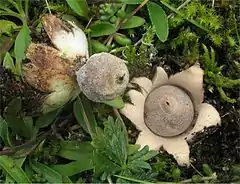| Geastrum minimum | |
|---|---|
 | |
| Scientific classification | |
| Kingdom: | |
| Division: | |
| Class: | |
| Order: | |
| Family: | |
| Genus: | |
| Species: | G. minimum |
| Binomial name | |
| Geastrum minimum | |
| Synonyms[2] | |
|
Geastrum cesatii Rabenh. (1851) | |
Geastrum minimum or tiny earthstar is an inedible species of mushroom belonging to the genus Geastrum. Although rare, it is widespread in Europe, where it occurs in a range of habitats.[3] It is a priority species in the UK, where it has been found in the sand dunes at Holkham National Nature Reserve.[4][5]
The species was first described by Lewis David de Schweinitz in 1822.[2]
Description
Fruit bodies are initially roughly spherical before the outer peridium splits to form a star with 6–11 "rays". When opened, the diameter of the fruit body is 1–3 cm (0.4–1.2 in). The inner spore sac is spherical or egg-shaped, and measures 0.5–1 cm (0.2–0.4 in). The more-or-less round spores measure 5–5.5–4–4.5 μm and have warts on their surface.[6]
References
- ↑ von Schweinitz; Lewis David (1822). "Synopsis fungorum Carolinae superioris". Schriften der Naturforschenden Gesellschaft in Leipzig (in German). 1: 20–131 (see p. 58).
- 1 2 "Geastrum minimum Schwein. 1822". MycoBank. International Mycological Association. Retrieved 17 September 2012.
- ↑ Laessoe, T; Pegler, D N; Spooner, B (1995). British Puffballs, Earthstars and Stinkhorns: An Account of the British Gasteroid Fungi. Kew, UK: Royal Botanic Gardens. p. 100. ISBN 0-947643-81-8.
- ↑ Telfer, Mark G; Lambdon, Philip W; Gurney, Mark (2000). "Recent discoveries among the gasteroid fungi of Norfolk". Field Mycology. 1 (1): 30–32. doi:10.1016/S1468-1641(10)60011-4.
- ↑ "UK Priority Species data collation Geastrum minimum" (PDF). JNCC. Retrieved 17 September 2012.
- ↑ Ellis, J B; Ellis, M B (1990). Fungi without Gills (Hymenomycetes and Gasteromycetes): An Identification Handbook. London, UK: Chapman and Hall. p. 229. ISBN 0-412-36970-2.